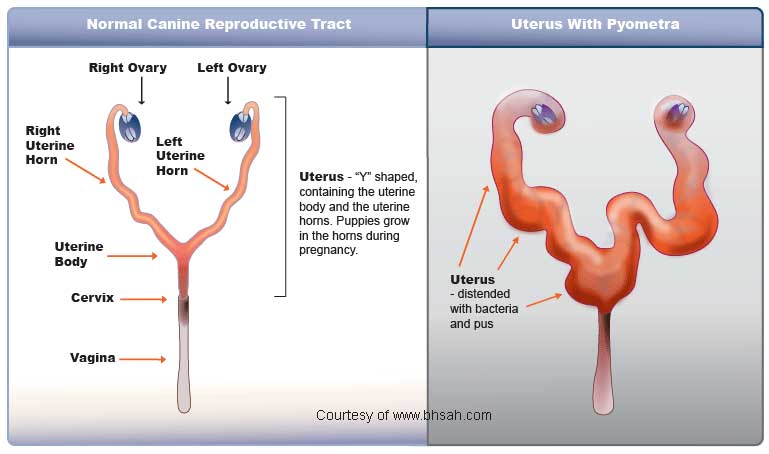Although pyometra is a fairly common condition, many people don’t know what it is.
Pyometra is an infection of the uterus (womb), common in female dogs and cats that haven’t been spayed.
In dogs, every time they have a season (usually about twice a year) they undergo all the hormonal treatments associated with pregnancy, regardless whether or not she is pregnant.
The changes that occur in the uterus during each season, increases the chances of an infection with age. A very common organism called E. coli, found in your dog’s faeces, usually causes pyometra. Some injections with hormone, either to prevent seasons or for the treatment of other conditions can increase the chances of pyometra developing.

The signs usually develop around four to six weeks after the female has finished bleeding from her last season. In some cases, the bitch may appear to be having a prolonged season.
The signs and symptoms to look out for are:
Early stages:
- Licking back end more
- Season lasts longer than usual
- Off colour
- Off her food
- Drinking and urinating more
- Vomiting
Advanced stages:
- Pus coming from vulva
- Swollen abdomen
- Collapse
If your dog has this condition, urgent treatment may be required, if left untreated these signs will worsen to the point of dehydration, collapse and death from septic shock, so please contact your vet as soon as possible.
Diagnosis and treatment
Your vet will probably suspect your dog has pyometra based on your description of the signs and from their examination of your pet.
They may suggest procedures such as ultrasound and blood tests to confirm the diagnosis, rule out other possible causes, and to check that your pet is well enough to undergo treatment.
The treatment of choice for pyometra is surgery to remove the uterus. The operation is essentially the same as a routine spay.
However, there is more risk involved and a higher chance of complications when the operation is being carried out on a sick pet. Your dog will also be given intravenous fluids (a drip), antibiotics and pain relief.
Can I prevent pyometra?
Most dogs will make a full recovery after treatment for pyometra, if the condition is caught early. Spaying your dog before she develops a pyometra will prevent this condition occurring.
If left untreated, or if the dog has had a pyometra for a while before presentation, she may be septic (bacteria has gone into the bloodstream) and more prolonged hospitalisation and treatment may be required. In this situation the prognosis is usually worse.
